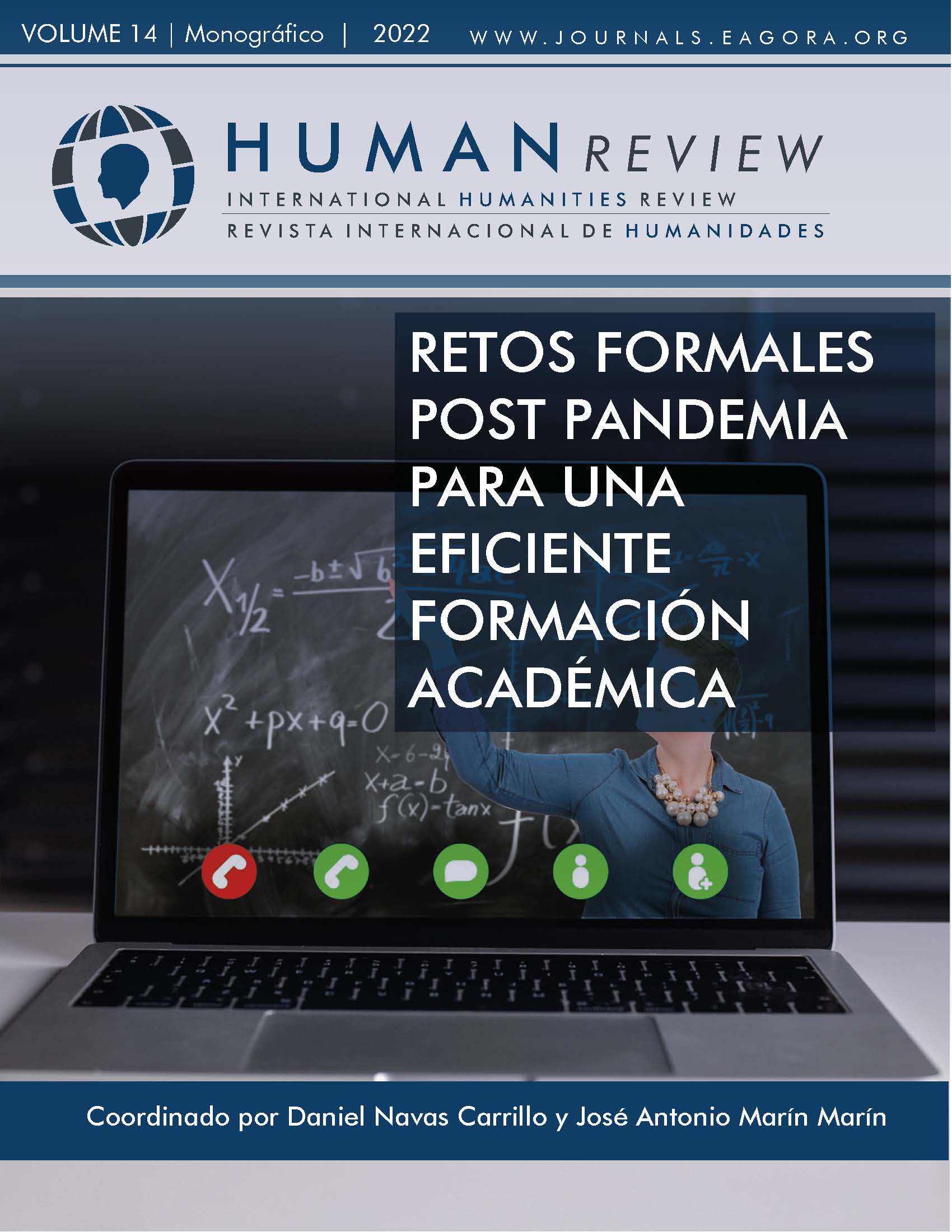Online teaching in Spain after the pandemic
Challenges and opportunities in formal education
DOI:
https://doi.org/10.37467/revhuman.v11.4150Keywords:
Online teaching, ICT, Blended teaching, COVID-19, E-learning, Formal education, TeachersAbstract
The present study examined teachers’ perceptions about their teaching practices and use of ICTs before and after the COVID-19 pandemic, by means of two questionnaires. Results showed a general increase in the use of ICTs, although it was less marked in those teachers who used them sporadically. Furthermore, teachers perceived an increase in students’ motivation and an improvement of academic results in the school year 2020/21. Teachers also noted the difficulties they found to follow the curriculum, to evaluate students and to solve disruptive behaviors online.
References
Alfaro, A. P., Fernández Prieto, M. S. y Alzarado, R. I. (2014). El uso de las TIC en la formación permanente del profesorado para la mejora de su práctica docente. Revista científica electrónica de Educación y Comunicación en la Sociedad del Conocimiento, 14(1), 70-95. https://doi.org/10.30827/eticanet.v14i1.11986 DOI: https://doi.org/10.30827/eticanet.v14i1.11986
An, Y., Kaplan-Rakowski, R., Yang, J., Conan, J., Kinard, W. y Daughrity, L. (2021). Examining K-12 teachers’ feelings, experiences, and perspectives regarding online teaching during the early stage of the COVID-19 pandemic. Educational technology research and development, 69(5), 2589-2613. DOI: https://doi.org/10.1007/s11423-021-10008-5
Barbour, M. K. y Unger-Harrison, K. (2016). Teachers’ perceptions of K-12 online: Impacting the design of a graduate course curriculum. Journal of Educational Technology Systems, 45(1), 74-92. https://doi.org/10.1177/0047239516637072 DOI: https://doi.org/10.1177/0047239516637072
Bárcena-Toyos, P. (2022). Teacher identity in CLIL: A case study of two in-service teachers. Latin American Journal of Content & Language Integrated Learning, 15(2). https://doi.org/10.5294/laclil DOI: https://doi.org/10.5294/laclil.2022.15.1.6
Cohen, E. B. y Nycz, M. (2006). Learning Objects and E-Learning: an Informing Science Perspective. Interdisciplinary Journal of e-Skills and Lifelong Learning, 2, 23-34. https://doi.org/10.28945/399 DOI: https://doi.org/10.28945/399
Coman, C., Tiru, L. G., Mesesan-Schmitz, L., Stanciu, C. y Bularca, M. C. (2020). Online Teaching and Learning in Higher Education during the Coronavirus Pandemic: Students’ Perspective. Sustainability, 12(24), 10367. https://doi.org/10.3390/su122410367 DOI: https://doi.org/10.3390/su122410367
Di Pietro, M. (2010). Virtual school pedagogy: The instructional practices of K-12 virtual school teachers. Journal of Educactional Computing Research, 42(3), 327-354. DOI: https://doi.org/10.2190/EC.42.3.e
Díez-Gutiérrez, E.J. y Gajardo, K. (2021). Repensar la educación online durante el confinamiento: la visión de las familias de Castilla y León. Revista de Investigación en Educación, 19(1), 25-41. https://revistas.webs.uvigo.es/index.php/reined DOI: https://doi.org/10.35869/reined.v19i1.3511
Fortová, N., Sedlácková, J. y Tuma, F. (2021). “And my screen wouldn’t share”: Student-teachers’ perceptions of ICT in online teaching practice and online teaching. Íkala Revista de Lenguaje y Cultura, 26(3), 513-529. http://doi.org/10.17533/udea.ikala.v26n3a03 DOI: https://doi.org/10.17533/udea.ikala.v26n3a03
Howard, S. K., Tondeur, J., Siddiq, F. y Scherer, R. (2020). Ready, set go! Profiling teachers’ readiness for online teaching in secondary education. Technology, Pedagogy and Education, 30(1), 141-158. https://doi.org/10.1080/1475939X.2020.1839543 DOI: https://doi.org/10.1080/1475939X.2020.1839543
Koohang, A., Riley, L. y Smith, T. (2009). E-Learning and Constructivism: From Theory to Application. Interdisciplinary Journal of E-Learning and Learning Objects, 5, 91-108. https://doi.org/10.28945/66 DOI: https://doi.org/10.28945/66
Mendoza, C. A., Enríquez Caro, L. C. y Castro Bermúdez, I. E. (2021). Estudio valorativo del proceso de enseñanza-aprendizaje en tiempos de la COVID-19. Perspectiva del docente. Revista electrónica cooperación Universidad Sociedad, 6(1), 1-6. DOI: https://doi.org/10.33936/recus.v6i1.2655
Morgan, H. (2020). Best practices for implementing remote learning during a pandemic. The Clearing House: A Journal of Education Strategies, Issues and Ideas, 93(3), 135-141. https://doi.org/10.1080/00098655.2020.1751480 DOI: https://doi.org/10.1080/00098655.2020.1751480
Palloff, R. M. y Pratt, K. (2003). The virtual student: A profile and guide to working with online learners. Jossey-Bass.
Robinia, K. A. y Anderson, M. L. (2010). Online teaching efficacy of nurse faculty. Journal of Professional Nursing, 26(3), 168-175. https://doi.org/10.1016/j.profnurs.2010.02.006 DOI: https://doi.org/10.1016/j.profnurs.2010.02.006
Ruiz Varona, J. M. (2020). Los retos de la formación permanente del profesorado ante la crisis del Covid-19. Trabajadores/as de la enseñanza, 376 24-24. https://fe.ccoo.es/dbd92e62e5a2027c7a1c5f24ae37c926000063.pdf
Tham, C. M. y Werner, J. M. (2005). Designing and evaluating e-learning in higher education: A review and recommendations. Journal of Leadership & Organizational Studies, 11(2), 15-25. https://doi.org/10.1177/107179190501100203 DOI: https://doi.org/10.1177/107179190501100203
Torrado Cespón, M. (2021). TIC/TAC y COVID-19: uso y necesidades del profesorado de secundaria en Galicia. Digital Education Review, 39(m), 356-373. https://revistes.ub.edu/index.php/der/article/view/32798/pdf DOI: https://doi.org/10.1344/der.2021.39.356-373
UNESCO. (2020). Education: From disruption to recovery. https://en.unesco.org/covid19/educationresponse
Weigel, V. B. (2002). Deep learning for a digital age. Jossey-Bass.
Wu, S.-Y. (2016). The Effect of Teaching Strategies and Students’ Cognitive Style on the Online Discussion Environment. Asia-pacific Education Research, 25(2), 267–277. https://doi.org/10.1007/s40299-015-0259-9 DOI: https://doi.org/10.1007/s40299-015-0259-9
Downloads
Published
How to Cite
Issue
Section
License
Those authors who publish in this journal accept the following terms:
- Authors will keep the moral right of the work and they will transfer the commercial rights.
- After 1 year from publication, the work shall thereafter be open access online on our website, but will retain copyright.
- In the event that the authors wish to assign an Creative Commons (CC) license, they may request it by writing to publishing@eagora.org









